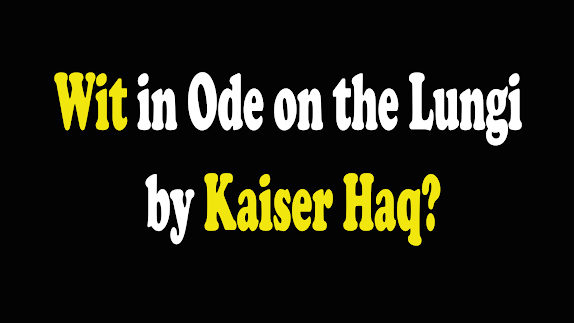How does Kaiser Haque use wit in Ode on the Lungi?
Kaiser Haq is a jolly writer with extraordinary sense of humor and wit. His intention isn’t simply to amuse individuals, but to ridicule and correct them. He is cognizant of the utilization of Babu English that has affected several areas including English language learning methodology at schools. To mock at this prevailing trend of Babu English, Haq even has written poems in Sub-continental English.
His use of irony and humor connect on to the prevailing issues in this country that have apparently taken us to the damaging and suicidal neocolonial reign. The aim of his poems is to get the colonial political system of this country and the way the grip of modern colonial aggression is robbery everything from us that we used to feel pleased with.
In several poems, Haq replaces several English words with Bengali words to talk clearly, with boldness and on to his readers (local and international). Haq has been writing since Nineteen Sixties, and surprisingly, it’s found that he was predetermined regarding his writing designs. It might be that he feels comfy with it. He didn’t stop victimization his ironic language, amusing puns and simple language that is usually a poem vogue. His famous poem, “Ode On The Lungi” sounds very comic in the sense that this piece is a tribute to Lungi (a rectangular stitched garment vertically sewed stitched a textile tube). He punned with the title of the poem that contrasts with the titles of poems by great romantic English poets like Keats and Shelley. Haq uses lungi to produce humor and critical meaning.
The poet urges that, being a familiar dress among individuals over the population of the USA at any time, the lungi, though a dress of the subaltern, should incline equal status and regard like any other popular dresses in the West. Lungi as a symbol of the subaltern, is ready to speak against torrential attack and encroachment of aggressive modernism beneath the gloss of globalization that is unendingly engaged in promoting/imposing Western and moralist culture.
The consciousness of distinction as a category with the exception of the common mass in their psyche and their behavior and actions make us understand that some sort of neo-imperialism is at play.
The modest lungi, therefore, is an emblem of equality in all respects: human, social, political and economic. The lungi, as a symbol of the excluded and marginalized individuals within the society, or within the words of the poet, “global left-outs‟, genuinely articulates its claim for equality, dignity and position within the global society. Though a symbol of “global left-outs”, a marginalized and neglected subaltern, yet, once it’s raised and flapped with dignity, it screams for equality. The poem meticulously tries to blur the social, political, economic and cultural binaries that exist in today’s polarized world. Haq’s sense of humour and use of wit is one in all his higher traits to impart the materialistic angle of this world.
Ode on the lungi is an expression of Haq’s as well as whole subcontinental cultural identity, subverting the colonial or imperial conventional legacy of social structures. Haq’s notion of exclusion encompasses two vast grounds; one that has been self-addressed wide and generally through various communications – writing, seminars, conference, etc. – is ‘equal human rights’ and also the alternative remained unaddressed is ‘sartorial right’. Haq has justly noted the cultural absurdities as “a clash of civilizations”.
The poem allegorically shatters the sartorial injustice inherent, and incoherent too, to Eurocentrism – the practice of world presentation from a European or Western-centered perspective intermeshed by the philosophic deformations of European capitalism. “Eurocentrism not only influences and alerts, however, truly produces different cultures”: “the kilt is with ‘us’/ but the lungi is with ‘them’!” (69 – 60). Such notion of partiality, fabricated to be a source of cultural meaning, engineers sartorial political system that produces a culture of sartorial difference during which piece of cloth is simply a “symbol of global left outs” (83) of the posh world and a “ridiculous ethnic attire” (88) of the marginalized autochthonic ‘other’ destitute of sartorial equality.
Kaiser Haq has thought from several angles. He has written regarding people, language, culture, autocracy, monocracy, freedom, corruption, war, violence, religion, education and even migration. Haq, through his gruesome sense of humor and playful wit.

